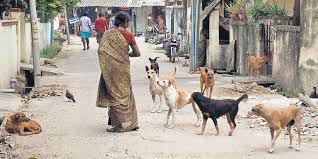Canine birth control: The paradoxical rule of Animal Welfare Board
The Animal Welfare Board of India in February 2021, made it clear that all the animal welfare organisations recognised by AWBI are not eligible to carry out canine sterilisation and vaccination programmes.
In a country where nearly 19 lakh dog bites were reported in 2022 alone, a new process of registration has resulted in only 21 organisations in the country getting permission to sterilise and vaccinate street dogs. Further, the Animal Welfare Board of India (AWBI) has made it difficult to obtain permission to perform Animal Birth Control (ABC) on dogs.
According to the last Livestock Census in 2019, approximately 53 lakh street dogs have been identified in India. Animal welfare activists and organisations say that the need of the hour is to multiply the pace of birth control and vaccinations. Instead, the Board has made the process of obtaining permission for ABC difficult at a time when cases of dog bites and attacks are being reported all over India.
According to Animal Birth Control (Dogs) Rules, 2001, local authorities are primarily implementing agencies to carry out the ABC/AR (anti-rabies) programme and for controlling the street dog population. If they are unable to do so, they can outsource to non-governmental organisations (NGOs), animal welfare organisations (AWOs) and private individuals to sterilise and immunise street dogs.
AWBI now wants all organisations registered with the Board to register with them again. “In a recent change of rules by the AWBI, the organisations have to do two things before performing ABC: re-register themselves with the AWBI and then apply for a separate certification for performing ABC. This takes anywhere between four to six months and only those who are super serious about getting this done can go through the difficult process,” says Suparna Ganguly, co-founder and trustee of CUPA, Bengaluru.
In a letter dated February 25, 2021, AWBI made it clear that all the AWOs recognised by the AWBI are not eligible to carry out ABC/AR. The reason attributed to this change in stance is that insufficient infrastructure and manpower of AWOs could lead to cruelty to animals, and separate permissions must be obtained, for carrying out ABC/AR programmes. This is where the issue poses a problem.
New rules increase monitoring but should hasten work
Shruti Vinod, an independent member of the Tamil Nadu Animal Welfare Board says that the AWBI guidelines were revised to regulate the ABC process after several botched-up surgeries were reported. But activists contend that making it so difficult to obtain certification poses a threat.
“The guidelines are a good way to monitor ABC/AR in the states, but making it very difficult to acquire permission will lead to a population explosion of stray dogs, which is going to pose a huge public health threat. There should be a strong monitoring mechanism for making sure that the surgery is performed efficiently and in a humane way, but at the same time, the process is extremely slow. Only 21 organisations have obtained this certificate since 2021,” says Antony Rubin, a Chennai-based animal activist.
Suparna says that the ABC certification process entails inspection of facilities available if we have the necessary manpower, training, qualification, etc. “The process should be hastened. Delaying the permission has an impact on both the health of the dogs and the public. We cannot rely entirely on government facilities because they cannot spare manpower for such a large number of dogs, along with their other commitments such as livestock,” she explains. Suparna points out that dogs also need to be vaccinated for distemper and canine parvovirus, as these are health diseases that affect dogs post-surgery.
Ironic and no-win rule to get a certificate
Nandita Subbarao, one of the co-founders of Citizens for Animal Birth Control, says that AWBI has a paradoxical prerequisite. “According to AWBI, mass ABC programmes can be undertaken only if you get their accreditation, but it also says that you will be given accreditation, only if you have done a few thousand sterilisation procedures. How is this possible?” she asks. This task of the AWBI has seen to it that no new organisations have managed to get a certification.
This impractical rule of AWBI is likely to lead to a dog population explosion and culling and killing of dogs, Nandita says. The repercussions of not sterilising or improperly performing the procedure are severe. In addition to an increase in the dog population, it poses the threat of more aggressive male dogs on the street. “A non-neutered male dog is going to be much more aggressive and a non-neutered female dog will lead to doubling of dog population twice a year. The male dogs will be more aggressive when trying to mate and attack each other. Many times, pet dogs get attacked and killed, and even humans get caught in between the attacks,” she says. Activists and animal lovers say that a mere ABC is not the only reason behind the aggressiveness of dogs.
Pravallika, an advocate and member of the Society for Prevention of Cruelty to Animals (SPCA) in Telangana, says that rules become important as many organisations misappropriate money provided for ABC. Stating that the new process is complicated, she says that it is important for the welfare of the animals. “This is the responsibility of SPCA and should be carried out immediately. The government is duty-bound to take care of living beings, and this includes animals. It is the government who should be monitoring and sterilising dogs,” she adds.
Public needs awareness about ABC
Nandita explains that there is no need for the public to fear all dogs. “We should look out for a dog with a notched ear. This means the dog is neutered and vaccinated with the rabies vaccine. In case the dog is without a notch, a person should know whom to contact and get the dog vaccinated. There should be a hotline for this purpose,” she suggests.
“A dog with a notched ear is safe and not every biting dog is a rabid dog. We should teach people how to approach dogs. This can be done through community collaboration with the local authorities. Bengaluru has a great citizen advocacy mechanism and collaborative local authorities, and more cities should replicate this model. Also, AWBI should be supportive in increasing ABC footprint and they cannot be inactive like they are now,” says Harini, founding member of Citizens for Animal Birth Control.

A dog with one of its ear notched
What should be done now?
The order of AWBI, which mandated the re-registration of AWOs for performing sterilisation, has been stalled by an interim order of the High Court of Punjab and Haryana. Justice Vinod S Bhardwaj stayed the AWBI order taking into consideration that “the impasse reached the level of the local government, the state government and the AWBI.”
The interim order has been well-received by the AWOs and activists, but they are wary of what the permanent rules will entail. “Right now, we are in a place where ABC should be done on a war footing across the states and also the country. For this, we need a lot more players. The AWBI can provide some basic training programmes, lay down the code of conduct, and supervise regularly. But we need more AWOs to participate in the program,” Nandita says.
Antony Rubin says that NGOs also face the problem of insufficient payment. “Earlier, it was around Rs 455 for a dog in Greater Chennai Corporation limit and Rs 700 in other parts of Tamil Nadu. AWBI, in a circular in April 2022, said that it is Rs 1,450 for pre and post-operative care and Rs 200 for catching a dog, which is very low given the current inflation. The AWBI should look into this aspect so that more NGOs participate in the programme,” he says. A scientific approach is needed to address dog population control, he adds.
Arun from PFCI outlines the importance of following due procedure. “The dogs should be properly captured and released in the same locality. There should also be a tab on the meat shops and unchecked garbage bins, which lead to the multiplication of the dog population,” he says. He says that the government should strengthen the monitoring mechanism to ensure that sterilisation is conducted properly.
Assistant Secretary of AWBI Prachi Jain, responding to the concern about the delay in the registration process, says that it is not from the end of AWBI. “The delay is caused due to the delayed inspection process by Animal Husbandry Departments in the states. As soon as we get the report, we expedite the process. Sometimes there are delays in submitting reports, and sometimes the NGOs do not fill out the application properly so it becomes pending and difficult. It is not delayed from our end. We usually process an application within two to three days,” she said and added that it was the responsibility of local authorities to control the population of dogs at the end of the day.
Source- https://www.thenewsminute.com/news/canine-birth-control-paradoxical-rule-animal-welfare-board-174135



